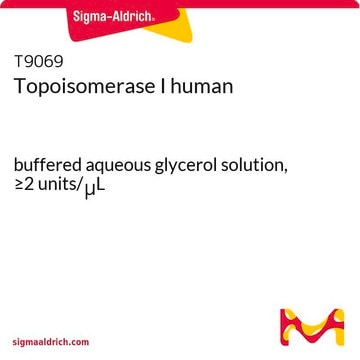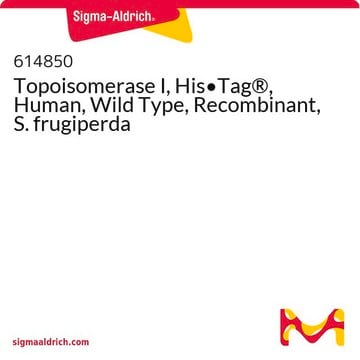T9194
Topoisomerase I from vaccinia virus
buffered aqueous glycerol solution
Sinónimos:
TOPO® I
Iniciar sesiónpara Ver la Fijación de precios por contrato y de la organización
About This Item
Número de CAS:
Número MDL:
Código UNSPSC:
12352200
Productos recomendados
origen biológico
vaccinia virus
Formulario
buffered aqueous glycerol solution
mol peso
32 kDa
aplicaciones
genomic analysis
Condiciones de envío
wet ice
temp. de almacenamiento
−20°C
Aplicación
Enzyme activity is increased in the presence of 2.5 mM Mg2+.
Topoisomerase I from vaccinia virus can be used for studying pivotal biological process such as-replication, transcription, recombination as well as DNA structure and topology which includes chromatin reconstitution in vitro and the degree of supercoiling of DNA. Additionally, the product helps in relaxing the DNA coils and exposes the restriction sites which facilitates in enhancing the restriction endonuclease digestion of resistant DNA. It is also used for assaying mutant plasmids which differ in length by only one base-pair.
Acciones bioquímicas o fisiológicas
Topoisomerase I from vaccinia virus also refers as TOPO®I is a type I DNA topoisomerase, which cleaves DNA at the preferred sequence [5′(C/T)CCTTI]. The product assists in releasing the supercoiling and torsional tension of DNA by cleaving and religating the phosphodiester bonds in a single strand of DNA.
Topoisomerase I relaxes supercoiled DNA molecules. The enzyme initiates transient breakages and rejoins of phosphodiester bonds in superhelical turns of closed-circular DNA. Enzyme activity is independent of right- and left-handed superhelices.
Definición de unidad
One unit coverts 1 μg of supercoiled closed circular (Form I) pUC19 DNA to relaxed closed circular form (Form II) in 1 hr at 37 °C.
Forma física
Solution in 50 mM Tris HCl, pH 7.5, containing 100 mM NaCl, 1 mM EDTA, 1 mM DTT, 0.1% Triton X-100, and 50% glycerol.
Información legal
TOPO is a registered trademark of Life Technologies
Código de clase de almacenamiento
10 - Combustible liquids
Clase de riesgo para el agua (WGK)
WGK 2
Punto de inflamabilidad (°F)
Not applicable
Punto de inflamabilidad (°C)
Not applicable
Elija entre una de las versiones más recientes:
¿Ya tiene este producto?
Encuentre la documentación para los productos que ha comprado recientemente en la Biblioteca de documentos.
Analysis of topoisomerase-DNA interactions by electrophoretic mobility shift assay.
S Shuman
Methods in molecular biology (Clifton, N.J.), 95, 65-74 (2000-11-23)
Rajesh Nagarajan et al.
Biochemistry, 45(18), 5775-5782 (2006-05-04)
Vaccinia DNA topoisomerase (vTopo) is a prototypic eukaryotic type I topoisomerase that shows high specificity for nucleophilic substitution at a single phosphodiester linkage in the pentapyrimidine recognition sequence 5'-(C/T)+5 C+4 C+3 T+2 T+1 p / N(-1). This reaction involves reversible
Mary R Stahley et al.
Biochemistry, 49(13), 2786-2795 (2010-03-02)
The type I DNA topoisomerase from vaccinia virus (vTopo) forms a reversible covalent 3'-phosphotyrosyl linkage with a single strand of duplex DNA at the preferred sequence 5'-(C/T)CCTTp downward arrowN(-1)N(-2)N(-3)-3'. The enzyme-DNA covalent adduct is recombinogenic in cells, because the nicked
C Cheng et al.
Nucleic acids research, 28(9), 1893-1898 (2000-04-11)
The specificity of vaccinia topoisomerase for transesterification to DNA at the sequence 5'-CCCTT and its versatility in strand transfer have illuminated the recombinogenic properties of type IB topoisomerases and spawned topoisomerase-based strategies for DNA cloning. Here we characterize a pathway
B O Krogh et al.
The Journal of biological chemistry, 276(24), 20907-20912 (2001-06-16)
Vaccinia topoisomerase forms a covalent DNA-(3'-phosphotyrosyl)-enzyme intermediate at a pentapyrimidine target site 5'-CCCTTp downward arrow in duplex DNA. By introducing single 2'-5' phosphodiesters in lieu of a standard 3'-5' phosphodiester linkage, we illuminate the contributions of phosphodiester connectivity to DNA
Nuestro equipo de científicos tiene experiencia en todas las áreas de investigación: Ciencias de la vida, Ciencia de los materiales, Síntesis química, Cromatografía, Analítica y muchas otras.
Póngase en contacto con el Servicio técnico








